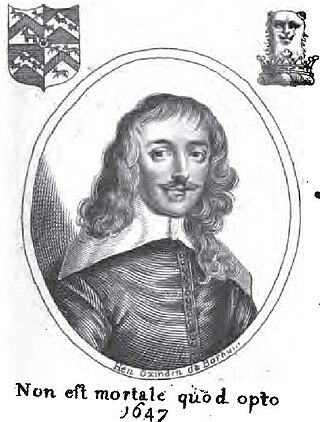Related Research Articles

Viscount St Davids, of Lydstep Haven in the County of Pembroke, is a title in the Peerage of the United Kingdom. It was created in 1918 for John Philipps, 1st Baron St Davids. The Philipps family descends from Sir John Philipps, who represented Pembrokeshire in the House of Commons. In 1621 he was created a Baronet, of Picton Castle in the County of Pembroke, in the Baronetage of England. His grandson, the third Baronet, also sat as Member of Parliament for Pembrokeshire. He was succeeded by his son, the fourth Baronet. He represented Pembroke and Haverfordwest in Parliament. His son, the fifth Baronet, sat for Haverfordwest. He was succeeded by his younger brother, the sixth Baronet. He represented Carmarthen, Petersfield and Pembrokeshire in the House of Commons.

George Booth, 1st Baron Delamer, was an English landowner and politician from Cheshire, who served as an MP from 1646 to 1661, when he was elevated to the House of Lords as Baron Delamer.
Sir Anthony Irby was an English politician who sat in the House of Commons at various times between 1628 and 1682.
This is a list of High Sheriffs of Pembrokeshire. The High Sheriff is the oldest secular office under the Crown. Formerly the High Sheriff was the principal law enforcement officer in the county but over the centuries most of the responsibilities associated with the post have been transferred elsewhere or are now defunct, so that its functions are now largely ceremonial. The High Sheriff is reappointed in March of each year.

Sir Henry Oxenden, 1st Baronet (1614–1686) was an English politician who sat in the House of Commons at various times between 1645 and 1660.

Sir Edward Seymour, 2nd Baronet was an English landowner and politician who sat in the House of Commons between 1601 and 1625. He was an ambassador to Denmark. During the English Civil War, he supported the Royalist cause.
John Campbell of Stackpole Court and Cawdor (1695–1777), was a British politician. He was a Member of Parliament (MP) for Pembrokeshire, Nairnshire, Inverness Burghs and Corfe Castle.

Sir John Henry Scourfield, 1st Baronet was a Welsh Conservative politician who sat in the House of Commons from 1852 to 1876.
Sir Hugh Owen, 1st Baronet was a Welsh politician who sat in the House of Commons variously between 1626 and 1660. He sided originally with the Parliamentarian side in the English Civil War, but the strength of his allegiance was in doubt.
Sir Thomas Cheek, Cheeke or Cheke was an English politician who sat in the House of Commons in every parliament between 1614 and 1653.
Sir Henry Felton, 2nd Baronet was an English politician who sat in the House of Commons between 1656 and 1679.

Thomas Crew, 2nd Baron Crew of Steane, Northamptonshire was an English politician who sat in the House of Commons at various times between 1654 and 1679, when he inherited the peerage Baron Crew.

Sir Erasmus Philipps, 3rd Baronet was a Welsh politician who sat in the House of Commons in 1654 and 1659.
Sir Hugh Owen, 2nd Baronet (1645–1698) was a Welsh politician who sat in the House of Commons of England at various times between 1676 and 1695.
Sir William Wiseman, 1st Baronet of Rivenhall Place, Rivenhall End, Essex was an English landowner and politician who sat in the House of Commons between 1677 and 1685.

Sir William Owen, 4th Baronet (1697?–1781), of Orielton, Pembrokeshire, was a Welsh politician who sat in the House of Commons for 52 years from 1722 to 1774.

George Lort-Phillips was Conservative Member of Parliament for Pembrokeshire in Wales from 1861 until his death.
Sir Roger Lort, 1st Baronet (1607/8–1664) was a Welsh Neo-Latin poet.

Sir Willoughby Hickman, 3rd Baronet (1659–1720) of Gainsborough Old Hall, Lincolnshire was a British landowner and politician who sat in the English House of Commons between 1685 and 1706 and in the British House of Commons from 1713 to 1720.

Sir Arthur Owen, 3rd Baronet, of Orielton, Pembrokeshire, was a Welsh Whig politician who sat in the English and British House of Commons between 1695 and 1727.